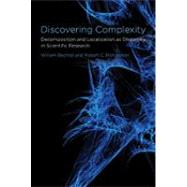
Note: Supplemental materials are not guaranteed with Rental or Used book purchases.
Purchase Benefits
Looking to rent a book? Rent Discovering Complexity Decomposition and Localization as Strategies in Scientific Research [ISBN: 9780262514736] for the semester, quarter, and short term or search our site for other textbooks by Bechtel, William; Richardson, Robert C.. Renting a textbook can save you up to 90% from the cost of buying.
| Preface to the MIT Press Edition | p. xi |
| Preface to the Original Edition | p. xiii |
| Introduction: Discovering Complexity-Further Perspectives | p. xvii |
| The Appearance of a New Mechanistic Philosophy of Science | p. xvi |
| Discovery Heuristics: Conceptual and Experimental | p. xx |
| Decomposition and Localization | p. xxviii |
| Recomposing and Situating Mechanisms | p. xxxvii |
| Model Systems, Conserved Mechanisms, and Generalization | p. xl |
| Rethinking Emergence | p. xliv |
| Conclusion | p. xlvii |
| Scientific Discovery and Rationality | |
| Cognitive Strategies and Scientific Discovery | p. 3 |
| Rationalizing Scientific Discovery | p. 3 |
| Procedural Rationality | p. 11 |
| Complex Systems and Mechanistic Explanations | p. 17 |
| Mechanistic Explanation | p. 17 |
| Decomposition and Localization | p. 23 |
| Hierarchy and Organization | p. 27 |
| Conclusion: Failure of Localization | p. 31 |
| Emerging Mechanisms | |
| Introduction | p. 35 |
| Identifying the Locus of Control | p. 39 |
| Introduction: Identifying System and Context | p. 39 |
| External Control: The Environment as a Control | p. 41 |
| Internal Control: The System as a Control | p. 47 |
| Fixing on a Locus of Control: the Cell in Respiration | p. 51 |
| Conclusion: Localization of Function | p. 59 |
| Direct Localization | p. 63 |
| Introduction: Relocating Control | p. 63 |
| Phrenology and Cerebral Localization | p. 65 |
| Competing Models of Cellular Respiration | p. 72 |
| Conclusion: Direct Localization and Competing Mechanisms | p. 88 |
| The Rejection of Mechanism | p. 93 |
| Introduction: Mechanism and Its Opponents | p. 93 |
| Flourens and the Integrity of the Nervous System | p. 95 |
| The Vitalist Opposition to Mechanistic Physiology | p. 99 |
| Conclusion: Setting for Descriptions | p. 113 |
| Elaborating Mechanisms | |
| Introduction | p. 119 |
| Complex Localization | p. 125 |
| Introduction: Constraints on Localization | p. 125 |
| Top-Down Constraints | p. 128 |
| Bottom-Up Constraints | p. 138 |
| Conclusion: The Rise and Decline of Decomposability | p. 145 |
| Integrated Mechanisms | p. 149 |
| Introduction: Replacing a Direct Localization | p. 149 |
| Direct Localization of Fermentation in Zymase | p. 153 |
| A Complex Linear Model of Fermentation | p. 156 |
| An Integrated System Responsible for Fermentation | p. 163 |
| Conclusion: The Discovery of Integration | p. 168 |
| Reconstituting the Phenomena | p. 173 |
| Introduction: Biochemical Genetics | p. 173 |
| Classical Genetics | p. 175 |
| Developmental Genetics | p. 181 |
| One Gene/One Enzyme | p. 188 |
| Conclusion: Reconstituting the Phenomena | p. 192 |
| Emergent Mechanism | |
| Introduction | p. 199 |
| "Emergent" Phenomena in Interconnected Networks | p. 202 |
| Introduction: Dispensing with Modules | p. 202 |
| Hierarchical Control: Hughlings Jackson's Analysis of the Nervous Systems | p. 203 |
| Parallel Distributed Processing and Cognition | p. 210 |
| Distributed Mechanisms for Genomic Regulation | p. 223 |
| Conclusion: Mechanistic Explanations without Functional Decomposition and Localization | p. 227 |
| Constructing Causal Explanations | p. 230 |
| Decomposition and Localization in Perspective | p. 230 |
| Four Constraints on Development | p. 234 |
| Conclusion: Looking Forward | p. 243 |
| Notes | p. 245 |
| References | p. 257 |
| Index | p. 281 |
| Table of Contents provided by Ingram. All Rights Reserved. |
The New copy of this book will include any supplemental materials advertised. Please check the title of the book to determine if it should include any access cards, study guides, lab manuals, CDs, etc.
The Used, Rental and eBook copies of this book are not guaranteed to include any supplemental materials. Typically, only the book itself is included. This is true even if the title states it includes any access cards, study guides, lab manuals, CDs, etc.